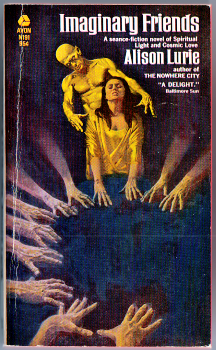Speaking of Roszak, most of his novels would seem to be ideal "light reading" material for the RI set, including Bugs: A Novel of Terror in the Computer Age (1981):
Nobody could have imagined that information technology, the towering colossus that dominates our world, would meet its match in an innocent, six-year-old girl named Daphne. Yet the vengeful horror that this psychically gifted child lures out of the secret recesses of the world's computers rapidly grows into a global calamity. As the crisis deepens, powers darker and more mysterious than modern science can understand must be invoked in order to defend a threatened humanity. In Bugs, Theodore Roszak offers a tour de force exercise in science fiction. He ingeniously combines the divergent worlds of high tech, the occult, and feminist psychology. With admirable ambiguity, he leaves us to wonder if Daphne's "bugs"-these arcane forces that stubbornly resist the advance of technology-are mankind's enemies or allies.
Oh, and Dreamwatcher (1985):
Imagine having the power to observe the dreams of others-to have intimate knowledge of the most secret desires, the most dreaded terrors, the childish delights, the sexual fantasies of anyone you might choose. Then imagine having the power to enter those dreams and reshape them. Deirdre Vale is a dreamwatcher, one of a select group whose extraordinary talent could be a boon to medical science. But as she discovers to her horror, her powers have become the focus of malicious intrigue whose purpose is not to heal the soul, but to torment it with lethal nightmares. Theodore Roszak's Dreamwatcher is a haunting psychological thriller, a story that finds both terror and heroism in the depths of the dreaming mind.
An Amazon review of same:
Deirdre Vale, formerly a patient at the respected Devane Clinic, and now an unofficial assistant to Dr. Aaron Devane himself, is a dreamwatcher. While not dreaming herself, she can enter into the dreams of others, either to observe their dreams, or to actually reshape & redirect them. What she doesn't suspect is that Dr. Devane long ago made a Faustian bargain with government intelligence, which funds the clinic & uses other dreamwatchers to destroy its perceived enemies ...
Stop right there!
If this story sounds familiar, it's because you may have seen the Dennis Quaid movie "Dreamscape," released in 1984. Granted, entering the dreams of others is a time-honored science-fiction trope; but the fact that this novel was published 3 years before the film appeared and includes so many of the same elements, right down to the sadistic, psychopathic psychic assassin, makes me wonder if the screenwriters were (ahem) "inspired" by Roszak's work.
Never mind. While "Dreamscape" is an enjoyable romp, this novel has much more ambition & depth. Roszak's breadth of knowledge, from politics & social-cultural critique to art & transcendence, is all put to excellent use in these pages. Using the form of the psychological science-fiction thriller, he delves into the use & abuse of science, the nature of dreams, the complexities of human sexuality, and the corruption of official power -- political & religious. The result is a gripping story that works both as exciting thriller & rich food for thought.
While the specifics of the plot reflect the political background of 1981, the struggle it depicts is all too timeless & contemporary. And it goes beyond politics to examine the deeper, eternal struggle each of us confronts within the universe of the psyche: hope & despair, destruction or healing. It's occasionally disturbing to read, as Roszak shows us just how vile & twisted the human soul can become in the pursuit of power. But it's never gratuitous shock for shock's sake.
As a novelist, Roszak is justly acclaimed for "Flicker" -- yes, soon to be a major motion picture (or so they keep saying), and a powerful one if done right. But he deserves to be equally acclaimed for this earlier novel, which I'm pleased to see in print once more. Most highly recommended!
